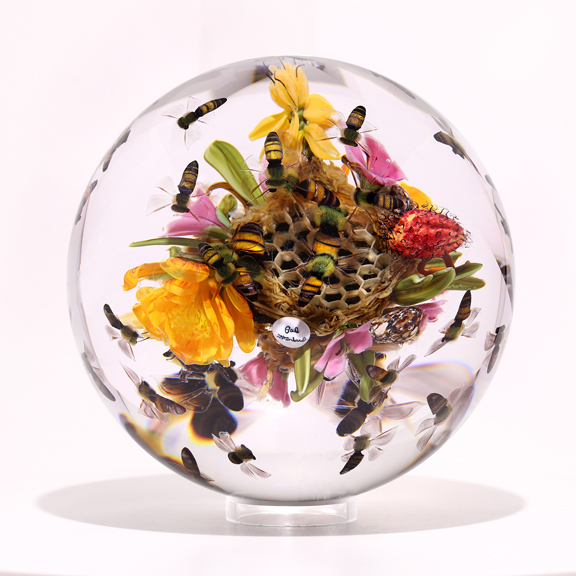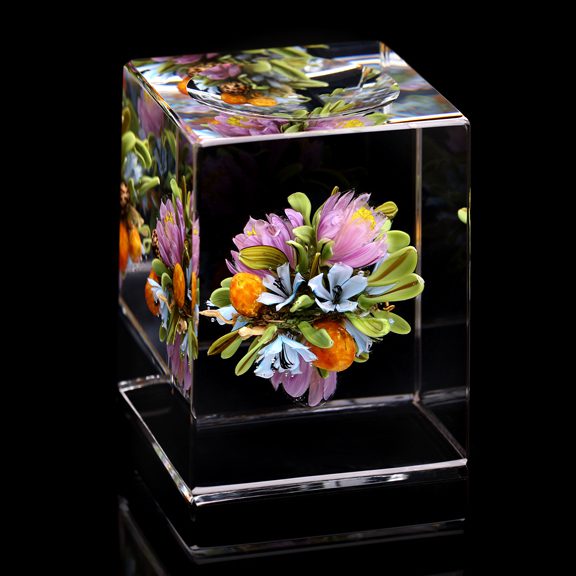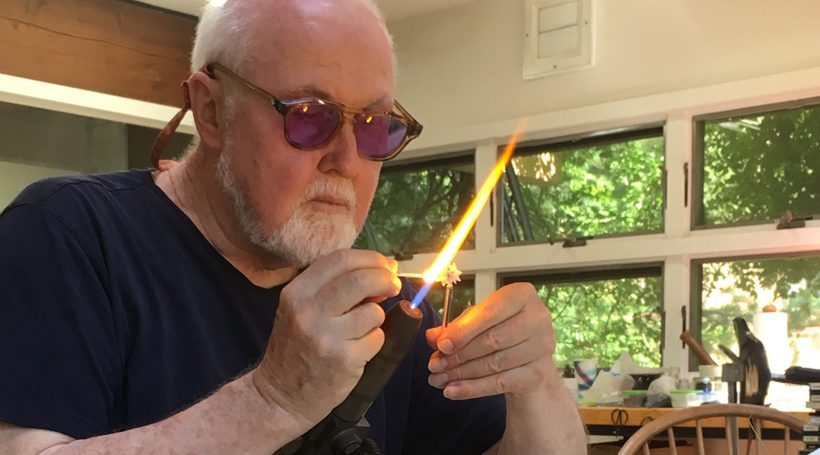Many 80-year-olds are quite familiar with the concept of retirement, of taking time to sit back and relax. But glass artist Paul Stankard is not most people. He has entered his 80s with a flurry of activities and accolades: a new book, a documentary film, a 5-month-long museum retrospective and honors in his name from a local college and an arts center.
“I’m pretty busy,” he says. “I feel blessed.”
This pace is not altogether surprising for anyone who knows Stankard. For the past 62 years, his life’s work and passion has been flameworking – an intricate process where molten glass is re-melted and shaped with tools and hand movements.

Honeybee swarm in Walt Whitman’s Garden
Photographs, however precise, cannot quite do Stankard’s creations justice. That’s because they offer the viewer a microcosm of the plant kingdom, a dazzling garden of delicate glass bouquets and roots with honeybees, fruit and blossoms so believable you’d swear they are real. But everything is, indeed, glass… from the tiniest insects to the most colorful flowers.
A Stankard glass sculpture – which can cost upwards of $45,000 – is enthralling, magnificent and a bit mysterious. That mystery is explored in his recently published 4th book, “Inspiration from the Art of Paul J. Stankard: A Window into my Studio and Soul.” It serves as both a colorful coffee-table book and inspiration for aspiring artists.
Stankard believes the book will complement his work long after he’s gone. A 5-year project, the book is his way of “sharing a strategy to put yourself and your creativity into a professional realm,” he says. He covers topics such as building a
routine, learning from failure and fusing spirituality and art-making. “This is the book I wish I had when I was getting started,” Stankard says. “I consider it my way of giving back to the creative community, regardless of the process.”
Stankard’s own road to success was a long and often arduous one. Born in 1943, this Massachusetts native was fascinated with nature from an early age and was always “good with his hands,” as his mother would tell him. Stankard’s family moved to South Jersey in 1958 and he struggled through school as an undiagnosed dyslexic, graduating near the bottom of his Pitman High School class.
After graduation, Stankard’s father encouraged him to enroll in a scientific glass-blowing program at what is now Salem Community College, believing he could land a good job in the industrial glass industry, which he did. But the more skilled Stankard became, the more he felt the pull of his burgeoning dream of being on the creative side of glass.
It started with simple flame-worked glass animals, worked on during his lunch break or in the evenings at home. Stankard sold them to friends and at craft galleries for modest prices. But, as he explains, it wasn’t about the money. It was about his need to be creative. With no living mentor to show him the way, Stankard “pretty much reinvented the process of 19th century French paperweights.” But instead of creating stylized flower patterns like the craftsmen of centuries past, Stankard copied nature, which he deeply cared about.

Walt Whitman’s Garden Cluster
“Nature speaks to us on many levels,” Stankard says. “It’s universal, and it’s eternal.”
By 1972, in his late 20s, Stankard made the risky decision to devote himself fulltime to his art. He developed a strong discipline for both glass-working and marketing of his art. It didn’t take long for Stankard’s reputation to grow worldwide, along with the demand for his creative output.
With their imagery of the natural world, Stankard’s glass creations – he makes, on average, one each week – carry a strong emotional impact, something he thinks relates to the fact that nature mirrors the life cycle of humans.
“With my art, I go inward, and by going inward, its appeal becomes universal,” he explains.
Despite a recent bout with cancer, Stankard, whose works are displayed in more than 75 museums around the world, continues to teach at Salem Community College as an artist-in-residence. Last year, the school’s Carney’s Point campus unveiled a 15,000-square-foot studio/lab named in his honor.
Earlier this year, WheatonArts celebrated the artist’s 80th birthday at a fundraising event to launch the inaugural Paul Stankard Flamework Fellowship. Beginning in 2024, the Fellowship will be awarded to an emerging or mid-career artist who is “innovating and pushing the boundaries of artwork made with a torch.”
Teaching is not only rewarding, Stankard says, but helps ensure the glass tradition will continue. One person who has experienced more personalized teaching lessons than perhaps any other is David Graeber, Stankard’s studio assistant for nearly 35 years.
Graeber, himself now a glass artist, first met Stankard when he was 18 years old, pumping gas.
“To me, Paul’s a hero and a genius,” the 56-year-old Graeber says. “I was working fulltime as a foreman in a sign shop, and I dropped everything to work for him. It was the best decision I ever made.” Learning through “instruction and osmosis,” as Graeber puts it, he himself is now a teacher of paperweight-making.
It was more than a year ago that Graeber floated the idea of a documentary film about Stankard to area documentary maker, Dan Collins, who he met at a film premiere in Chicago. Collins suggested that Graeber take the lead as producer, helping solicit funding for the project. Now, after 8 months of filming, “Paul J. Stankard: Flower & Flame” is complete. A public screening of the film will be held at Perkins Center for the Arts in Collingswood at the end of this month.
“My style is to create a portrait of the artist through a conversational narrative, where he tells his story,” Collins says. “I go a little bit deeper, a little beyond, to try to really capture the spirit of the artist, both personally and professionally.”
Collins calls the film “the best work I’ve ever done,” and hopes to land a spot on PBS and show it at events throughout the state.
“Along with these stunning visuals – it’s gorgeous to film molten glass – Paul also lays out these wisdoms about freeing yourself to have creative breakthroughs.”
In 2014, Stankard was successfully treated for prostate cancer and is now receiving weekly treatments for blood cancer. But even that challenge hasn’t really slowed him down – aside from the occasional daytime nap, he jokes. Along with teaching and making art, Stankard last year was invited to join a men’s Bible Study group, which he says has “spiritually energized my creative expressions in ways that have been very exciting.”
“You can always keep learning,” he says, “and I am.”














